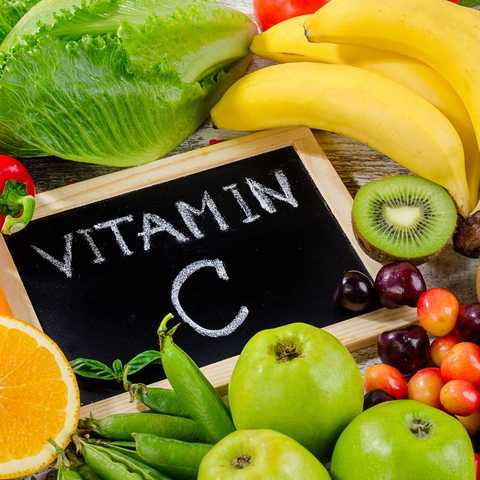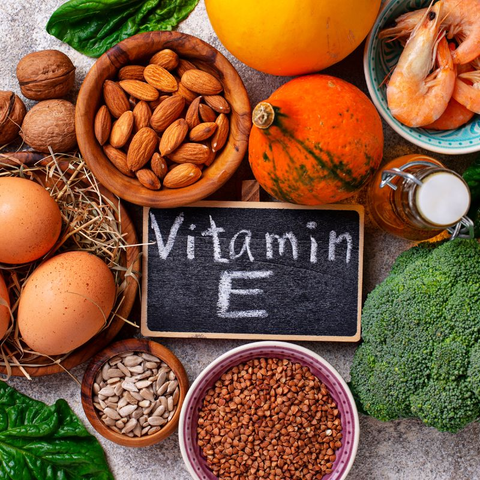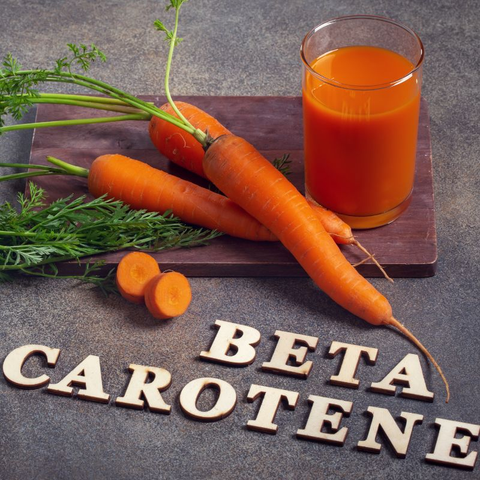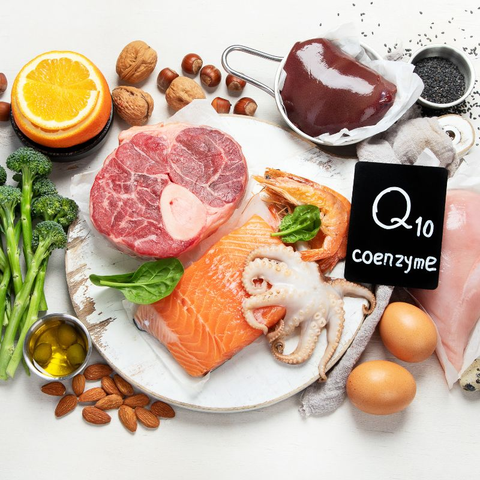

· By Lorea Lastiri
Which Form of Antioxidant Supplement Should You Take? (Answered!)
Antioxidants are potent compounds that protect cells from oxidative stress, which accelerates aging and causes several diseases.
These molecules help your cells fight free radicals—unstable forms of atoms that cause cellular damage—reducing the risk of inflammation, cardiovascular disease, diabetes, and certain cancers.
Antioxidant supplements help your cells replenish the stores of these molecules, exerting a cytoprotective effect. However, not all supplements are created equal.
The form in which you consume antioxidants impacts their effectiveness and the benefits your body receives. It is essential to pick the right supplements that are easy to absorb, have good antioxidant effects, and are free of additives and preservatives.
It is essential to understand the nuances of antioxidant supplements so you can pick the best ones and maximize their health benefits.
In this article, we will examine the science behind antioxidant supplements, compare their efficacy, and learn how to pick the best ones.
Overview of antioxidant supplements
While you can get antioxidants from fresh fruits and veggies, according to the CDC, only 1 in 10 adults in the US get enough of them. Antioxidant supplements are a great option in such situations to replenish the nutrients you can’t get through diet alone.
Antioxidant supplements are concentrated forms of nutrients that prevent or slow down oxidative damage to your cells.
These supplements often contain one or a combination of antioxidant molecules, such as vitamins C, E, and beta carotene.
The efficacy of these supplements is based on their ability to donate electrons to free radicals, stabilizing them and preventing them from taking electrons from cellular components.
This results in a shielding effect that protects cells from harm and assists the body’s natural defense against free radicals.
Types of antioxidant supplements
Antioxidant supplements come in different forms, containing various antioxidant substances. You can find two types of antioxidant supplements in the market:
- Supplements containing a single type of antioxidant molecule like vitamin C, beta carotene, or selenium, and
- Formulations with a blend of different molecules
The combination formulations contain molecules that work synergistically with each other, boosting their protective effect. If you want to get the most benefit from your supplement, you must ensure that it contains the right molecules in proper proportions.
Here are some of the most common forms of antioxidant molecules used in supplements:
Vitamin C

Chemically known as Ascorbic acid, vitamin C is a natural, free-radical scavenging antioxidant that supports your immune system. It also helps in endogenous collagen production, which protects your skin from aging.
It is a water-soluble molecule that is easily absorbed in your gut and has no known side effects, even after consuming mega-doses. It is one of the safest antioxidant supplements you can take.
Antioxidant supplements containing vitamin C come in different forms—chewable tablets, powders, and capsules.
Vitamin C synergizes with other antioxidants and is often used as a part of antioxidant blend formulations.
Vitamin E

Chemically known as Tocopherol, vitamin E is a powerful antioxidant that protects cells from free radical-induced damage. It is especially protective for cell membranes that are more vulnerable to free radical attack.
Vitamin E is also essential in regulating the immune system and skin health and might help reduce cancer risk.
You can get vitamin E supplements in two forms:
- Containing natural d-alpha-tocopherol, and
- Containing synthetic d-alpha-tocopherol
While the synthetic version is effective, it is not as efficiently absorbed as the natural form of vitamin E.
Beta-carotene

Also known as provitamin A, beta carotene is converted in your body to the active form of vitamin A. It has a strong antioxidant effect and protects your eye health. Several combination beta-carotene supplements are on the market.
However, you must stay within the recommended dosage limit, as excess beta-carotene supplementation can lead to hypervitaminosis A. In this condition, there is too much vitamin A in your body.
Selenium
Selenium is an essential mineral that regulates your metabolism and thyroid function. It also acts as a coenzyme to several essential enzymes in the cell and is directly involved in neutralizing free radicals.
Selenium works best when combined with other antioxidant molecules like vitamin C and vitamin E to protect you from cardiovascular disease.
Flavonoids
Flavonoids are a group of phytochemicals (chemicals found in plants) that have a strong antioxidant effect. Plant sources rich in flavonoids include turmeric, ginseng, garlic, cinnamon, and green tea.
Antioxidant supplements containing extracts of these plants can provide a concentrated amount that is easy to absorb.
Coenzyme Q10 (CoQ10)

CoQ10 is an endogenous compound in your cells that helps in energy production through oxidative mechanisms. It is crucial for the proper functioning of the heart, muscles, and immune system.
Unfortunately, as you age, the level of CoQ10 in your body starts to decline, leading to insufficient amounts to exert the protective effects.
Supplements containing CoQ10 fulfill this deficiency, improving your health outcomes.
However, it is vital to ensure that the supplement you get includes the active form of CoQ10.
Polyphenols
Like flavonoids, polyphenols are found naturally in several plant foods, such as fruits, vegetables, tea, and wine. These compounds exert a potent free radical scavenging effect that protects cells from oxidative damage.
Several studies have shown that including polyphenol supplements in your diet can improve digestion, protect you from cardiovascular disease, and prevent type-2 diabetes.
You must consult your doctor or healthcare provider before starting any supplements, including antioxidant supplements. They will help you determine the correct type of supplement for your health needs.
Also read: Supplements or vitamins to boost your energy? (Answered).
What is the best form of antioxidant supplement?
While the 'best' form of antioxidant supplement depends on your healthcare needs, there are specific criteria that you should look at when selecting a supplement.
They include:
A broad spectrum of antioxidants
The best antioxidant supplement offers a wide range of antioxidants to target different types of free radicals.
A formulation with vitamin C and Vitamin E, Selenium, and plant compounds like flavonoids and beta-carotene ensures a comprehensive antioxidant defense system.
Bioavailability
Ensure that the supplement you get contains antioxidants in an easily absorbable form. Some natural antioxidant compounds, like vitamins C and E, are more bioavailable than others.
Similarly, opt for natural, organic versions of these antioxidants whenever possible. For instance, the artificial form of vitamin E is less absorbed than the natural form, making it less effective.
Synergistic combinations
Certain antioxidants exert a synergistic effect when combined. A supplement formulated to leverage this synergy is more effective than taking individual antioxidants separately.
For instance, vitamin C can regenerate oxidized vitamin E, providing a complementary protective effect, making the combination far superior compared to taking the vitamins individually.
Safety and purity
The supplement you choose should be free from contaminants and accurately labeled with its antioxidant content.
Always look for high-quality manufacturing practices and third-party testing, as they are indicators of a supplement’s safety and purity.
Additionally, it is essential that the supplement does not contain excessively high doses of antioxidants. Mega doses of antioxidants increase the risk of developing acute toxicity.
A supplement that fulfills these criteria is the best antioxidant supplement. Always choose a reputed brand like WhyNotNatural that uses 100% organic raw materials.
Our supplements are free from fillers and additives, and you only get what you need. Explore our collection of natural supplements today!
What are the health benefits of antioxidants?
Antioxidants are essential in maintaining your health and preventing diseases. By neutralizing free radicals, antioxidants help protect the body on a cellular level.
Here are some of the many health benefits that you get from antioxidant supplements:
Reduced risk of chronic disease
The most pronounced health benefit of taking antioxidant supplements is their ability to fight chronic diseases. Studies have shown that an antioxidant-rich, balanced diet can lower your risk of cardiovascular disease and certain cancers, including lung cancer.
Antioxidant vitamins like vitamins C and E, selenium, and beta-carotene play a crucial role in maintaining your health and the aging effects of free radicals.
Support for heart health

Antioxidants have been shown to exert a cardio-protective effect by several mechanisms. For instance, they can improve the ability of your blood vessels to dilate.
Antioxidants also help your cells slow down the oxidation of Low-density lipoproteins (LDLs), which are responsible for the development of cardiovascular disease, including atherosclerosis.
Antioxidants may reduce the risk of heart conditions by protecting the cardiac muscles and blood vessels from oxidative damage. They have also been shown to be effective in preventing prostate cancer.
Enhanced immune function
Certain antioxidants, like vitamin C and flavonoids, can enhance your immune function and protect against infections. They also support the production and function of leucocytes (white blood cells), which help protect your body against infections.
Moreover, they may control your body's "redox state" so that there is low oxidative stress on the cells.
Skin health and anti-aging benefits
Antioxidants such as vitamin E and carotenoids, for instance, prevent the skin from free-radical-related damage brought about by UV radiation and environmental pollution.
They can also prevent premature skin aging by reducing the development of wrinkles and preserving the skin’s elasticity.
Certain antioxidants also have anti-inflammatory qualities that help reduce skin conditions like acne and eczema.
Maintenance of eye health
Antioxidants are essential in maintaining eye health and preventing age-related macular degeneration (AMD) and cataracts. Some of the best naturally occurring antioxidants for eye function include lutein, zeaxanthin, and vitamins C and E.
They fight against oxidative damage and maintain healthy vision.
Improved cognitive function
There is ample evidence to show that antioxidant intake can prevent cognitive decline. Antioxidants that act as oxygen scavengers reduce the oxidative stress in your brain, which can, in turn, lower the risk of neurodegenerative diseases such as Alzheimer’s and Parkinson’s.
Antioxidants play a tremendous role in human health. Nevertheless, you should ensure that you are getting them from reliable and trusted sources.
Supplements can be a great way to meet your body’s requirements for these essential nutrients and maintain good health.
How safe are antioxidant supplements?

Most antioxidant supplements are safe to use, provided you take them in the right amount. However, continued excess dosing of antioxidants might cause toxic effects as they tend to accumulate in your body.
Consuming certain antioxidants in excess risks disrupting your body’s natural oxidative process.
While you might be consuming antioxidants to reduce the oxidative stress in your body, an excess of them might have a paradoxical effect.
Rather than reducing oxidative stress, a high amount of antioxidants might exacerbate it.
In addition, the formulation of the antioxidant supplement greatly influences its safety. Natural sources of antioxidants found in foods contain a balance of nutrients that may work synergistically with other nutrients in those foods, which is hard to replicate in supplement form.
Some supplements also use additives, fillers, artificial colors, and flavors, making the formulation significantly less safe to consume for a long time.
The best way to ensure the safety of your antioxidant supplement is to get it from reputed suppliers who follow good manufacturing practices (GMP) and use no artificial fillers and excipients.
WhyNotNatural provides you with the highest quality supplements that are organic, GMO-free, and pure. Check out our collection today.
Do antioxidant supplements have side effects?
While antioxidant supplements do have significant complementary and integrative health benefits, they do carry the risk of developing potential side effects, especially when consumed in quantities above the recommended range.
You must understand these potential side effects to prevent developing health issues. They include:
Vitamin C: Gastrointestinal disturbances
Although vitamin C is safe in moderate dosages, in higher doses, it may cause side effects like diarrhea and nausea.
Furthermore, if consumed in very large quantities, there is a chance of forming kidney stones in vulnerable people.
You must stay properly hydrated if you are on antioxidant vitamin C supplements to prevent possible issues.
Vitamin E: Increased hemorrhagic risk
Vitamin E prevents certain blood factors that manage clotting and can potentially thin the blood. It might lead to an increased risk of hemorrhage and stroke in vulnerable people.
You should consult your doctor before starting vitamin E supplements, especially if you are on blood thinners.
Beta-Carotene: Risks for smokers
While beta-carotene supplementation is relatively safe for the majority of the population, it might create specific problems for smokers or people exposed to asbestos.
Research suggests an increased risk of developing lung cancer in such individuals.
Selenium: Toxicity concerns
Selenium toxicity precipitates when you take an excess amount of the mineral as a dietary supplement. The symptoms of selenium toxicity vary in individuals but may lead to muscle stiffness, hair loss, and mild nerve damage.
Who should take antioxidant supplements?
You should consider supplements if you can't meet your antioxidant needs through diet alone. With over 84% of the US population deficient in vitamin E and 46% in vitamin C, supplements offer an efficient and safe way to meet dietary requirements.
Another group of people who should consider antioxidant intake are people with dietary restrictions and problems with nutrient absorption.
Smokers, as well as people who spend most of their time in polluted areas, need to get a supplement if their antioxidant system cannot handle the excess oxidative stress.
If you practice intensive physical exercises, you might require a higher concentration of micronutrients to deal with the oxidative stress caused by an increased metabolic rate.
How should I take antioxidant supplements?
The effectiveness of your antioxidant supplementation depends on several factors, including the type of supplement, your diet, your health status, and your goals.
You should also ensure that your supplements are absorbed in the body in the right amounts.
Can I take an antioxidant supplement daily?
You can take an antioxidant supplement daily, provided you stay within the ingredients' RDA. Your diet must also be considered when deciding the dosage of supplements.
How many antioxidant supplements should I take daily?
The number of supplements you should take daily will vary based on the specific antioxidant and its concentration in the supplement form.
Always adhere to the recommended daily allowance (RDA) or the advice of your healthcare provider to avoid overconsumption and potential adverse effects.
What is the best time to take antioxidant supplements?
The best time to take your antioxidant supplements depends on the type of supplement. For instance, supplements with fat-soluble antioxidants like vitamin E and beta-carotene should be taken after meals as your body is able to better absorb them.
On the other hand, you can be more flexible with water-soluble antioxidants like vitamin C.
Can antioxidant supplements be taken on an empty stomach?
Some antioxidants like selenium might cause a stomach upset if you take them on an empty stomach. While some supplements might not cause these effects, most doctors recommend you take antioxidant supplements with food.
What are the top food sources of antioxidants?
Several plant and animal products are rich in antioxidants, and including them in your diet can benefit you. Here are some antioxidant-rich foods:
Fruits

Besides the high vitamin C content in berries, they are rich in natural antioxidants such as tannins and polyphenols.
To get the most benefit, add blueberry, strawberry, raspberry, and blackberry to your diet, as they are the highest in absorbable antioxidants. If you intend to maximize the antioxidative capacity of fruits such as apples, grapes, cherries, and plums, avoid peeling them.
Vegetables
Try to include veggies from the Cruciferae family, like spinach, kale, and collard greens, which are rich in beta-carotene, lutein, and zeaxanthin.
Broccoli is rich in sulforaphane, a natural antioxidant used in a notable cancer prevention trial. Other antioxidant-rich veggies you should add to your diet include beets, carrots, artichokes, and pumpkins.
Nuts and seeds
Some nuts and seeds carry good types of fats and deliver antioxidants very well, which are relatively easy for your body to absorb.
Walnuts, for instance (which are high in flavonoids), are important for both the heart and the immunity. Bring flaxseeds and chia seeds into your diet, as they are also the source of Lignans, which are extremely powerful antioxidants.
Spices and herbs

Kitchen spices, particularly cloves, cinnamon, turmeric, and oregano, contain several natural antioxidants.
Adding them to your everyday meals enhances flavors and, consequently, beneficial nutrients.
Beverages
Green tea and coffee are excellent sources of dietary antioxidants, such as polyphenols. Drink green tea regularly to boost your metabolism and fight infections.
To obtain sufficient quantities of different types of antioxidants, try to include as many of these antioxidant foods as possible in your diet. You should also ensure that your diet is diverse, as different food varieties contain different types and amounts of these antioxidants.
Takeaway: Enhance your health journey with antioxidant power
Antioxidants are a group of potent molecules that protect your cells from oxidative damage. Unfortunately, your diet might not provide the required nutrients, necessitating supplementation.
Choosing antioxidant supplements that are easy to absorb, natural, and free of additives is a great way to ensure your body is equipped to handle oxidative stress.
Always talk to your doctor before starting any supplement, and stay within the recommended dietary recommendations.
WhyNotNatural is committed to your health and wellness through our 100% natural, organic, and GMO-free supplements.
Our dedication to avoiding additives ensures that you get pure and potent health products. Check out our collection of supplements today!
Don't forget to subscribe to our newsletter to learn which supplements to take, how to combine them for maximum benefit, and other health tips to boost your energy and vitality. Plus, discover natural strategies to reduce hormonal imbalances, stress, and anxiety. Click here to get started!

